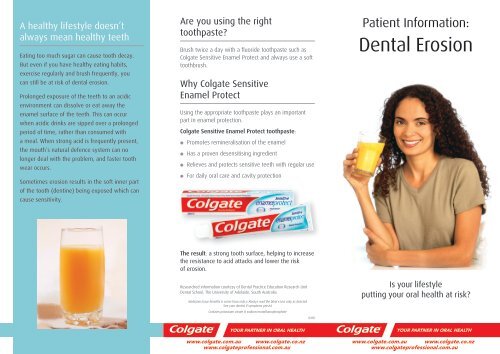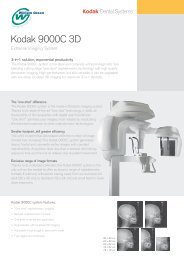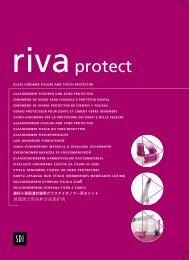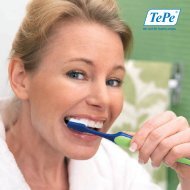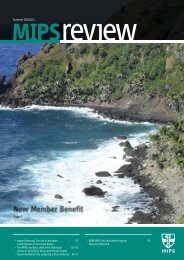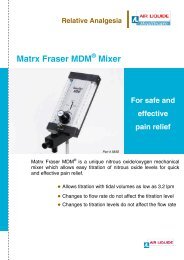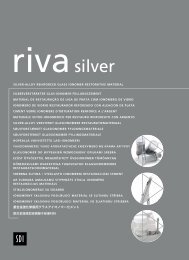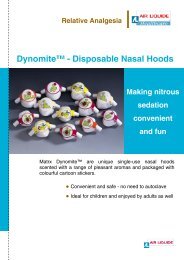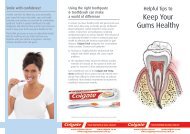Download the Dental Erosion Brochure
Download the Dental Erosion Brochure
Download the Dental Erosion Brochure
Create successful ePaper yourself
Turn your PDF publications into a flip-book with our unique Google optimized e-Paper software.
A healthy lifestyle doesn’t<br />
always mean healthy teeth<br />
Eating too much sugar can cause tooth decay.<br />
But even if you have healthy eating habits,<br />
exercise regularly and brush frequently, you<br />
can still be at risk of dental erosion.<br />
Prolonged exposure of <strong>the</strong> teeth to an acidic<br />
environment can dissolve or eat away <strong>the</strong><br />
enamel surface of <strong>the</strong> teeth. This can occur<br />
when acidic drinks are sipped over a prolonged<br />
period of time, ra<strong>the</strong>r than consumed with<br />
a meal. When strong acid is frequently present,<br />
<strong>the</strong> mouth’s natural defence system can no<br />
longer deal with <strong>the</strong> problem, and faster tooth<br />
wear occurs.<br />
Sometimes erosion results in <strong>the</strong> soft inner part<br />
of <strong>the</strong> tooth (dentine) being exposed which can<br />
cause sensitivity.<br />
Are you using <strong>the</strong> right<br />
toothpaste?<br />
Brush twice a day with a fluoride toothpaste such as<br />
Colgate Sensitive Enamel Protect and always use a soft<br />
toothbrush.<br />
Why Colgate Sensitive<br />
Enamel Protect<br />
Using <strong>the</strong> appropriate toothpaste plays an important<br />
part in enamel protection.<br />
Colgate Sensitive Enamel Protect toothpaste:<br />
l Promotes remineralisation of <strong>the</strong> enamel<br />
l Has a proven desensitising ingredient<br />
l Relieves and protects sensitive teeth with regular use<br />
l For daily oral care and cavity protection<br />
Patient Information:<br />
<strong>Dental</strong> <strong>Erosion</strong><br />
The result: a strong tooth surface, helping to increase<br />
<strong>the</strong> resistance to acid attacks and lower <strong>the</strong> risk<br />
of erosion.<br />
Researched information courtesy of <strong>Dental</strong> Practice Education Research Unit<br />
<strong>Dental</strong> School, The University of Adelaide, South Australia.<br />
Medicines have benefits & some have risks l Always read <strong>the</strong> label l Use only as directed<br />
See your dentist if symptoms persist<br />
Contains potassium citrate & sodium monofluorophosphate<br />
0410<br />
Is your lifestyle<br />
putting your oral health at risk?
<strong>Dental</strong> erosion<br />
Modern lifestyles present a number of challenges for<br />
your body including your teeth. <strong>Dental</strong> erosion is <strong>the</strong><br />
irreversible loss of tooth tissue due to exposure to acid.<br />
Sources of acid exposure can be intrinsic (from within<br />
your body) or extrinsic (from outside your body).<br />
People at risk from intrinsic acid exposure include those<br />
who experience gastric reflux or recurrent vomiting.<br />
Extrinsic acid can be found in some of our most popular<br />
everyday drinks and foods. These include:<br />
l Drinks such as fruit juice, wine, carbonated drinks,<br />
sports drinks<br />
l Foods such as citrus fruit<br />
l Medications eg. Vitamin C, aspirin and some<br />
iron preparations<br />
Dry mouth and erosion<br />
Saliva plays an important role in buffering acids within<br />
<strong>the</strong> mouth and reducing <strong>the</strong>ir effect on <strong>the</strong> teeth. It is<br />
<strong>the</strong> mouth’s own cleaning system. Saliva also dilutes<br />
and washes away food particles and acids. If you often<br />
have a dry mouth, erosion may damage your teeth<br />
more quickly.<br />
Controlling dental erosion<br />
Managing dental erosion requires managing<br />
<strong>the</strong> lifestyle factors which put you at risk while<br />
streng<strong>the</strong>ning your teeth against acid attack. Here are<br />
a few helpful tips:<br />
l Drink plenty of water<br />
l Drink milk or non-acidic drinks in place of<br />
carbonated drinks, fruit drinks, cordials<br />
l Drink quickly or with a straw (avoid sipping/<br />
swishing)<br />
l Restrict acidic foods and drinks to main meals<br />
l Avoid tooth-brushing for 30 minutes after eating<br />
or drinking acidic foods or drinks<br />
l Brush twice daily with a fluoridated toothpaste<br />
and a soft toothbrush<br />
l Ask your dentist if you would benefit from<br />
additional fluoride treatment (e.g. fluoride rinse)<br />
l Visit your dentist for regular check ups so that<br />
signs of erosion can be detected early<br />
Brushing straight after a meal<br />
Brushing your teeth straight after a meal may not be<br />
<strong>the</strong> good habit you think it is. To help control dental<br />
erosion, it is recommended you avoid brushing for<br />
at least 30 minutes after eating or drinking acidic<br />
food or drinks.<br />
Are you at risk?<br />
People with an increased risk of dental erosion include<br />
those who:<br />
l Have a high intake of acidic foods or drinks<br />
l Have low salivary flow or a dry mouth<br />
l Have insufficient water intake<br />
l Have a high intake of caffeine-containing drinks<br />
l Are dehydrated due to <strong>the</strong>ir active lifestyles


